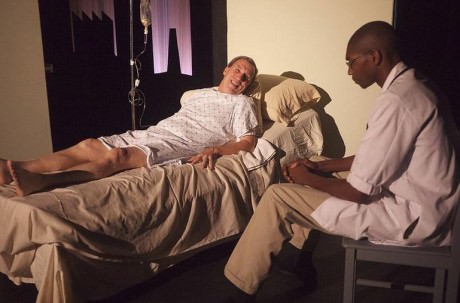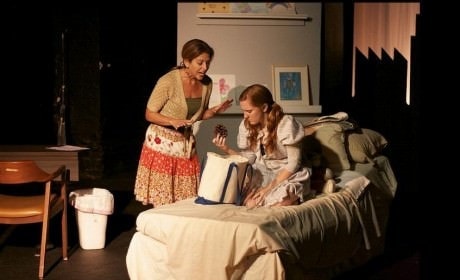An intriguing new look at life and death and all the things that go with it closes out the 15th season at The Mobtown Players. As a part of their Mobtown Playwright’s Group annual presentation, Stage IV, a new work by Madeline Leong, presents a look at how suffering is not just a physical condition, and that often those who are physically suffering do not realize how those that love them are also in a great deal of pain. Directed by Adam Kunsberg, this production has a great deal of potential while featuring some stellar and grounded acting of real live human beings in every day grievous situations which is easily relatable to the audience.

Playwright Madeline Leong has a brilliant concept twined into her work, and with a few revisions the play has a great deal of potential to become highly successful. At this point the production’s major dramatic question is still unclear. There are points where the major focus of the production wavers into side plots which never get wrapped up, and the characters are introduced in a way that leaves you caring heavily for some and not at all about others. Leong does an exceptional job of creating time skips in her play, making them easy to follow and serving the function of advancing the action. But for as well as these jumps in time are marked is as poorly as her sense of time’s passage is during the present day scenes. There is nothing to indicate how much time has passed between present scenes, thus making some of the premises held therein completely unbelievable. This comes to mind specifically after a major event occurs with Owen, and Emily encounters Dr. Sam at the tavern; because there is no delineation of time it would be impossible for them not to recognize each other immediately given their interactions in the previous scene.
There are no moments of superfluous dialogue but there is discord in the balance of telling emotions versus showing them. The ending feels slightly cheated as the audience isn’t led privy to any real resolution and we’re left wondering about many things. But overall the work is solid, with a captivating theme and a unique approach to such a frequently written subject matter.
Director Adam Kunsberg has five incredibly talented actors in his cast who do these slightly underdeveloped characters a great deal of justice. His blocking, in particular, shows dynamic relations between them, precise choices in certain scenes showing the closeness or strain between family and or potential lovers. Kunsberg’s choice not to play up the Baltimore accent in this production is a good one, not leaving any room for the audience to be distracted from what’s actually happening, despite the play’s local setting.
Set Designer Michelle Datz brings the most creative three-sided rotating flats to the stage to ease with scene changes. Datz’s tri-paneled rotating flats allow for quick shifts from the brightly decorated room of young Emily to the sterile and barren hospital room. Synched with Kunsberg’s sound design choices, the scene changes move fluidly never leaving the audience lingering in darkness longer than necessary; each series of sound effects signaling the shift in location.
Playing the psychiatrist Dr. Anna Rivera, with a major plot twist in her character, is Kathryn Falcone. While at first the character appears static and two-dimensional, Falcone slowly reveals her character’s aloof and reserved mannerisms to be deliberate choices, keeping all of her own drama bottled deep within herself; an ironic situation given that she’s the show’s psychiatrist. Falcone’s scenes are mostly interactions with Dr. Sam Adlam (Christopher Dews) and while she never raises her voice, she creates a present reality of concern and other emotions that draw attention to her existence without her ever really having to move or speak above a conversational tone.
Dews, as the short-tempered young doctor, plays on the opposite end of the spectrum. When he’s angry it’s a loud shouting outburst, when he’s frustrated his physical frame goes rigid. This creates a sharp contrast to most of the other characters in the production, especially in scenes opposite of Falcone. Torn with conflictions over his own mortality, and the controversial subject of physician assisted suicide, Dews digs deep into the character’s reality to let this turmoil play out over his face throughout the show.
The mother figure Carolyn (Jill Colucci) is presented in a very unique light. Introduced as a caring, loving, compassionate mother to young Emily (Julie Luzier) it is quickly learned that she’s not quite right in the head. Colucci makes the transition smoothly, though her timeline in the play is working backward, and shifts from innocent and stable to off-kilter and emotionally riled up with a fluid grace. Colucci’s presence on the stage is fierce, almost frightening when she’s playing with the matches, and she crafts an explosive verbal fight with Owen and with Emily throughout the show.
Luzier, first as the impetuous child and later as the lost artist, is a well-rounded performer. Her ability to adapt to the setting as a child is impressive, taking on the higher tone, the child-like gestures, even the body posture of a young girl really helps focus the audience to her character’s youth. When Luzier becomes grown-up Emily echoes of her childish personality are still present, allowing the audience to easily see that they were once one in the same person. Her compassionate pleas and worrisome nature over her father Owen (Steve Izant) makes for sever juxtaposition over her bohemian ways later in the performance.
Izant, as the ailing father is the epitome of a man who knows his time is coming. Maintaining the perfect balance between coughing and having trouble breathing, he plays the character in such a heart-breaking way that it’s hard not to break down and cry a little as you watch him in the early scenes. Proving himself a strong man in the flashbacks, Izant is present and pleasant despite the situations he finds himself in; a really gripping and grounded performance overall.

The acting is quite stellar and the sets are really impressive, so despite the plot discombobulation, this production is well worth seeing.
Running Time: Approximately 2 hours with one intermission.
Stage IV plays through August 10, 2013 at The Mobtown Theatre at Meadow Mill— 3600 Clipper Mill Road Suite 114, in Baltimore, MD. Tickets can be purchased at the door, or online.




